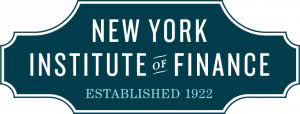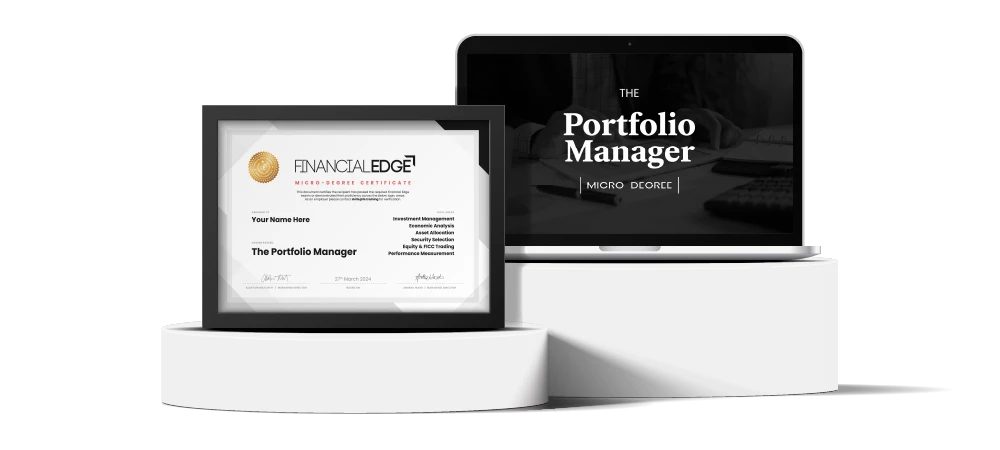Portfolio Management is a science and it is an art form. There is a lot of economic theory that goes into managing a portfolio of assets and no portfolio manager can succeed without this statistical, econometric and financial knowledge. However, in addition to the math, there are a lot of market factors that go into portfolio management.
This includes having an acute understanding of how seemingly discrete variables affect each other. Or how market react to different news. Or how behavioural science plays into asset pricing. Its a complex and expansive field and it is one where you need every edge you cant get to succeed. But those who do succeed, have an exceptionally rewarding career waiting for them.
What to look for in a Portfolio/ Asset Management Course
- Making sense of a complicated science. To be a good portfolio manager, you need match the economics and math with an understanding of business, markets, and human behaviour. These are the courses that have been cherry picked to do just that.
- Its a competitive field and you need the CV Boost. I have only listed courses and certifications with the most brand value on this list. Knowing your stuff is good and all, but first you need to have your CV shortlisted! These certification will provide you with a substantial CV boost by showcasing your expertise in portfolio management to potential recruiters.
- Laser focused. Your academic performance is one of the most important factors to getting a top finance job, but it does not teach you how to prepare for a specific job. For such high-demand finance jobs, you need to be laser focused on what is important. In addition to the theory, you need the practical experience of what portfolio managers do in the real world.
1. Portfolio Management Professional Certificate from NYIF
Course Review
The New York Institute of Finance has custom built this professional certification for portfolio managers. It offers unmatched insights into this discipline from an institution that is dedicated to covering investment banking, financial markets and related areas. NYIF certifications will provide you the best brand value for these careers as well.
The course covers fixed income and equity portfolio management, hedge fund operations and strategies, performance analysis, the investment decision making process, fund structures, private equity portfolio and other such topics relevant to portfolio and fund managers. Each module is chunky and you certainly don’t feel wanting after completing any of them.
The certifications has been designed to get you desk-ready. Which means you will be able to hit the ground running for an internship opportunity or a full-time analyst/ associate position. It would prove equally beneficial if you are looking for a career transition into portfolio/ fund management.
This certification offers the perfect blend of information, brand value and industry recognition and the laser focus on the topic of portfolio management that is necessary to break into the field and thrive. The content is designed by industry veterans and it shows. If you are serious about a career in portfolio management and need to break through the competition, you need to give this one a shot.
Summary
| Duration | Around 35 hours |
| Format | Fully online, on-demand |
| Level | Intermediate |
2. The Portfolio Manager from Financial Edge
(Note: Use code BBD25 for 25% off at Financial Edge)
Course Review
 Financial Edge is an elite training provider that top investment banks hire to train their staff. They have created this online course that encapsulates the same course material, training regimen and exercises that professionals at some of the worlds’ top investment banks are learning as part of their professional training. This is a unique opportunity to not only learn from the best, but also get a certification that signals that you have passed the same rigours training and tests (even the tests are fully online by the way) that industry professionals have to.
Financial Edge is an elite training provider that top investment banks hire to train their staff. They have created this online course that encapsulates the same course material, training regimen and exercises that professionals at some of the worlds’ top investment banks are learning as part of their professional training. This is a unique opportunity to not only learn from the best, but also get a certification that signals that you have passed the same rigours training and tests (even the tests are fully online by the way) that industry professionals have to.
If you are an avid reader of our blog, you would know that the biggest hurdle to getting your dream finance job is getting shortlisted. Certification like this one that are recognizable by the industry and actually used by the top banks can really go a long way to make you stand out. Given the competition, you need all the personal branding and CV boosts you can get. Most managers only look at a CV for 7 seconds on-average. You need to make an impression in that time.
Now that we have stressed upon the importance of certifications in personal branding and finance recruitment, lets dive into the actual course content. There is a lot to cover here and the entire certification will take you about 65 hours with over 300 exercises, dozens of hours of videos, downloadable pdf files containing slides and more quizzes than you can shake a fist at. I am not trying to intimidate you here, this is all a good thing! The more rigorous a course, the more weight it carries with recruiters. Wouldn’t you rather do all the hard work before the selection process? Besides, they do an excellent work explaining everything and make it easy.
Which brings us to the quality of the course content. The course content is well designed by industry experts with real experience in the field. This course in not an academic exercise but one that focuses on real world experiences and insights that you will need to use when you are actually sitting at your desk on your first day at the job.
You will learn about the investment management industry including all the players, asset allocation and economic analysis, security selection, modelling and financial statement analysis, valuation, equities and FICC trading and performance management. Its easy for me to just mention all these topics, but you will be spending 10-12 hours on some of them. Which is how it should be because you cant just become an ace portfolio or asset manager overnight. You have to work for it and this is how you do it.
When all is said and done, the reason that this course tops my list is because it has all the rigour and depth of professional certifications like the CFA but you don’t have to wait for 5-6 years to get it. You can complete the online tests online as soon as you complete a module and get that CV boost right away. That is how it should be.
Click here and use code BBD25 for a 25% discount on all Financial Edge courses!
Summary
| Duration | Around 65 hours |
| Format | Fully online, on-demand |
| Level | Intermediate |
3. Capital Markets & Securities Analyst (CMSA) from CFI
Course Review
The CMSA has been purpose built for markets related roles like portfolio and asset management. It covers topics like fixed income, equities, alternative investments, forex, commodities, diversification and everything else you need for these roles.
The best part about this certification is that the curriculum is highly modular and you can tailor it as per your needs. For example, if you are new to financial markets, you can choose to take some optional prep courses like Bloomberg essentials, economics for capital markets etc. This makes it suitable for candidates at all skill levels.
Similarly, you can pick and choose advanced electives as per your desired area of focus. These include Behavioral Finance, High Yield Bonds, Subordinated Debt and Loans, Trading Using Technical Analysis, Convertible Bonds, Intermediate Options – Trading Strategies etc. This makes the CMSA one of the most modular and versatile certifications related to market roles.
Click here and use code BBD10 for 10% off!
Summary
- Time to Complete: Should take around 60-100 hours depending on your skill level.
- Available fully online and on-demand.
- A solid certification for market related roles like wealth management that doesn’t take years to earn unlike the CFA.
4. Investment Management from the University of Geneva
Course Review
The Swiss do know how to manage money. Many of the global market leaders in asset/ portfolio management are Swiss Banks like UBS & Credit Suisse. Which is what got me interested in this particular course and it surely does not disappoint. It covers everything from a practical, real-world perspective and that is what makes this course so exceptional.
The specialisation is divided into 5 modules or sub-courses which cover most topics rather well. There is a special focus on understanding investors goals and needs, planning their wealth over a period of time and communicating with them effectively. These are essential practical skills that you need in the real world, especially if you are on the client side.
Interestingly, there are a lot of insights provided by guest lecturers form UBS and the Swiss Finance Institute which makes this course all the more interesting. It’s not a very math-heavy course and I feel it better serves those on origination or client servicing side of things.
This is a great personal branding opportunity and building up your CV fort a portfolio management role. The course offers a more holistic view at portfolio management covering strategic as well as foundational concepts and getting your face-to-face with industry experts.
Summary
- Time to Complete: Around 60 hours.
- Available fully online and on-demand.
- Best for portfolio managers on the client facing side of things in the front office or those interested in getting there.
5. Investment and Portfolio Management from Rice University
Course Review
A solid course that takes you through the process of building a “winning” investment portfolio. It provides you with a wonderful look into all the tools and financial instruments that you need and how to go about implementing your ideas. If you don’t have any prior investment experience and want to start from the beginning, this one a whirl.
The specialisation is divided into several modules covering portfolio selection, investment analysis, handling biases, risk management, portfolio analysis, setting goals, measuring performance, making adjustments etc. All topics are covered in sufficient detail to satisfy everyone form beginners to more skilled investment professionals.
There are a lot of interesting aspects like the creation of a simulated portfolio based on client goals which is then peer-graded based on your analysis, strategy and performance. You also get to use real world tools for creating and managing your mock portfolios.
The Capstone project that you need to complete as part of this specialisation is an interesting touch. It provides some practical experience which can be valuable. Most courses are too academic in their feel, but this one is a nice hybrid with plenty of opportunities to get your hands dirty. A decent addition to your CV or LinkedIn profile.
Summary
- Time to Complete: Around 72 hours.
- Available fully online and on-demand.
- Recommended for beginners who need to start from the basics.
6. Advanced Portfolio Management Professional Certificate from NYIF
Course Review
This is the advanced version of NYIF’s portfolio management certification. It provides a more hands on approach which means instructor-led learning. That inherently makes it better suited for those with some finance experience and basic understanding of investment principles. But if you have that experience, there is no better alternative out there.
The topics covered are appreciably different from the other course. Here, you look at more advanced and strategic concepts like performance and income attribution, risk management and control at a higher level, different asset classes and derivatives, behavioural aspects, portfolio theory and so on.
I would recommend this course to professionals who already have some portfolio or asset management experience under their belts and are looking to up their game. It would also be well suited for mid-level financial professionals looking for a career transition.
Summary
- Time to Complete: 5 days.
- Available fully online a virtual classroom or in-person.
- An advanced course recommended for experienced finance professionals looking to transition into portfolio management.
7. Investment Strategies and Portfolio Management from Wharton
Course Review
A course designed for mid or senior level executives covering topics like portfolio theory, performance measurement, investment policy, evaluating managers etc. This is not a brass-tacks course. This is a strategic level course meant for senior executives.
The course is not very quant/ math heavy. You look at strategic aspects of managing a portfolio including leadership tasks. But if you are looking for an Executive Education course, this is as good as it gets.
The course is a bit on the expensive side, so I recommend it for those who can secure a corporate sponsorship or senior level executives looking for some serious career transitions.

